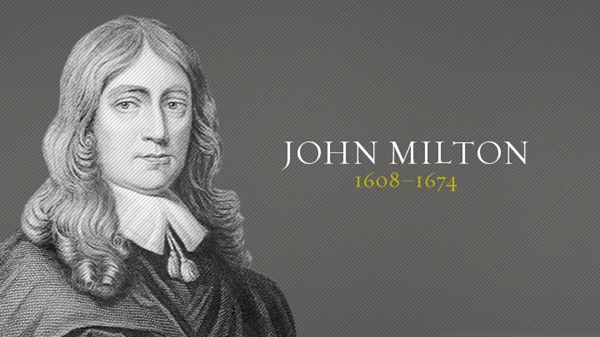PARADISE LOST: A Brief into John Milton's Epic Classical Poem of All Time

Did you know that Paradise Lost is ultimately not only about the downfall of Adam and Eve, but also about the clash between Satan and the Son of God (Jesus) that is centered on a biblical subject matter and a Christian idea of heroism?
Paradise Lost by John Milton was first published in 10 books in 1667 and then in 12 books in 1674, at a length of almost 11,000 lines. In Paradise Lost, Milton observed but adapted a number of the Classical epic conventions that distinguish works such as Homer’s The Iliad and The Odyssey and Virgil’s The Aeneid. Among these conventions is a focus on the elevated subjects of war, love, and heroism.
In Book 6 Milton describes the battle between the good and evil angels; the defeat of the latter results in their expulsion from heaven. In the battle, the Son (Jesus Christ) is invincible in his onslaught against Satan and his cohorts. But Milton’s emphasis is less on the Son as a warrior and more on his love for humankind; the Father, in his celestial dialogue with the Son, foresees the sinfulness of Adam and Eve, and the Son chooses to become incarnate and to suffer humbly to redeem them. Though his role as saviour of fallen humankind is not enacted in the epic, Adam and Eve before their expulsion from Eden learn of the future redemptive ministry of Jesus, the exemplary gesture of self-sacrificing love.
The Son’s selfless love contrasts strikingly with the selfish love of the heroes of Classical epics, who are distinguished by their valour on the battlefield, which is usually incited by pride and vainglory. Their strength and skills on the battlefield and their acquisition of the spoils of war also issue from hate, anger, revenge, greed, and covetousness. If Classical epics deem their protagonists heroic for their extreme passions, even vices, the Son in Paradise Lost exemplifies Christian heroism both through his meekness and magnanimity and through his patience and fortitude.
Like many Classical epics, Paradise Lost invokes a muse. This muse is the Judaeo-Christian Godhead. Citing manifestations of the Godhead atop Horeb and Sinai, Milton seeks inspiration comparable to that visited upon Moses, to whom is ascribed the composition of the book of Genesis. Much as Moses was inspired to recount what he did not witness, so also Milton seeks inspiration to write about biblical events.
Recalling Classical epics, in which the haunts of the muses are not only mountaintops but also waterways, Milton cites Siloa’s brook, where in the New Testament a blind man acquired sight after going there to wash off the clay and spittle placed over his eyes by Jesus. Likewise, Milton seeks inspiration to enable him to envision and narrate events to which he and all human beings are blind unless chosen for enlightenment by the Godhead. With his reference to “the Aonian mount,” or Mount Helicon in Greece, Milton deliberately invites comparison with Classical antecedents. He avers that his work will supersede these predecessors and will accomplish what has not yet been achieved: a biblical epic in English.
Paradise Lost also directly invokes Classical epics by beginning its action in medias res. Book 1 recounts the aftermath of the war in heaven, which is described only later, in Book 6. At the outset of the epic, the consequences of the loss of the war include the expulsion of the fallen angels from heaven and their descent into hell, a place of infernal torment. With the punishment of the fallen angels having been described early in the epic, Milton in later books recounts how and why their disobedience occurred.
Disobedience and its consequences, therefore, come to the fore in Raphael’s instruction of Adam and Eve, who (especially in Books 6 and 8) are admonished to remain obedient. By examining the sinfulness of Satan in thought and in deed, Milton positions this part of his narrative close to the temptation of Eve. This arrangement enables Milton to highlight how and why Satan, who inhabits a serpent to seduce Eve in Book 9, induces in her the inordinate pride that brought about his own downfall. Satan arouses in Eve a comparable state of mind, which is enacted in her partaking of the forbidden fruit, an act of disobedience.
Milton’s epic begins in the hellish underworld and returns there after Satan has tempted Eve to disobedience. In line with Classical depictions of the underworld, Milton emphasizes its darkness, for hell’s fires, which are ashen gray, inflict pain but do not provide light. The torments of hell (“on all sides round”) also suggest a location like an active volcano. In the Classical tradition, Typhon, who revolted against Jove, was driven down to earth by a thunderbolt, incarcerated under Mount Etna in Sicily, and tormented by the fire of this active volcano. Accommodating this Classical analogue to his Christian perception, Milton renders hell chiefly according to biblical accounts, most notably the book of Revelation. The poem’s depictions of hell also echo the epic convention of a descent into the underworld.
Throughout Paradise Lost Milton uses a grand style aptly suited to the elevated subject matter and tone. In a prefatory note, Milton describes the poem’s metre as “English heroic verse without rhyme,” which approximates “that of Homer in Greek, and of Virgil in Latin.” Rejecting rhyme as “the jingling sound of like endings,” Milton prefers a measure that is not end-stopped, so that he may employ enjambment (run-on lines) with “the sense variously drawn out from one verse into another.” The grand style that he adopts consists of unrhymed iambic pentameter (blank verse) and features sonorous rhythms pulsating through and beyond one verse into the next. By composing his biblical epic in this measure, he invites comparison with works by Classical forebears. Without using punctuation at the end of many verses, Milton also creates voluble units of rhythm and sense that go well beyond the limitations he perceived in rhymed verse.
Milton also employs other elements of a grand style, most notably epic similes. These explicit comparisons introduced by “like” or “as” proliferate across Paradise Lost. Milton tends to add one comparison after another, each one protracted. Accordingly, in one long passage in Book 1, Satan’s shield is likened to the Moon as viewed through Galileo’s telescope; his spear is larger than the mast of a flagship; the fallen angels outstretched on the lake of fire after their expulsion from heaven “lay entranced / Thick as autumnal leaves that strew the brooks / In Vallombrosa” (literally “Shady Valley,” outside Florence). The fallen angels resemble, moreover, the Egyptian cavalry that pursued the Israelites into the parted Red Sea, after which the collapse of the walls of water inundated the Egyptians and left the pharaoh’s chariots and charioteers weltering like flotsam.
Paradise Lost is ultimately not only about the downfall of Adam and Eve but also about the clash between Satan and the Son. Many readers have admired Satan’s splendid recklessness, if not heroism, in confronting the Godhead. Satan’s defiance, anger, willfulness, and resourcefulness define a character who strives never to yield. In many ways Satan is heroic when compared to such Classical prototypes as Achilles, Odysseus, and Aeneas and to similar protagonists in medieval and Renaissance epics. In sum, his traits reflect theirs.
But Milton composed a biblical epic in order to debunk Classical heroism and to extol Christian heroism, exemplified by the Son. Notwithstanding his victory in the battle against the fallen angels, the Son is more heroic because he is willing to undergo voluntary humiliation, a sign of his consummate love for humankind. He foreknows that he will become incarnate in order to suffer death, a selfless act whereby humankind will be redeemed. By such an act, moreover, the Son fulfills what Milton calls the “great argument” of his poem: to “justify the ways of God to man,” as Milton writes in Book 1.
Despite Satan’s success against Adam and Eve, the hope of regeneration after sinfulness is provided by the Son’s self-sacrifice. Such hope and opportunity enable humankind to cooperate with the Godhead so as to defeat Satan, avoid damnation, overcome death, and ascend heavenward. Satan’s wiles, therefore, are thwarted by members of a regenerate humankind who choose to participate in the redemptive act that the Son has undertaken on their behalf.
Source: Britannica
#penglobalentertainment



